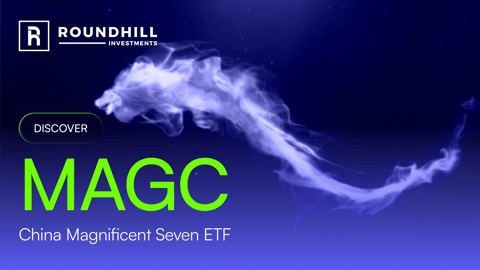Introducing MAGY: A New Way to Play the Magnificent Seven
A Challenging Quarter for Markets, but an Excellent Potential Quarter for Covered Calls
It’s been a challenging few months for markets. Since the beginning of the year, the S&P 500 is down 12% and the Nasdaq has fallen 15%. Conversely, the VIX (the Volatility Index) is up 15+ points but rallied as high as 60 intraday on April 7th.1
As an investor, watching your personal trading account drop, you must be thinking: what strategy is going to perform well in a high vol, falling equities environment? From our perspective, the answer is selling upside volatility to help buffer downside performance. This is also known as a covered call strategy.
As you can see in the below graphic, covered call strategies (both of the green lines showcase total exposure for covered call payout) may outperform the market (the solid grey line) in down-to-roughly flat markets. When volatility is high, the premium received for selling calls increases, which can result in the shift from the solid purple and green lines to the corresponding dotted lines. This combination of a down-to-neural market and high volatility is when we see the strongest potential for outperformance of a covered call strategy.
A New Covered Call ETF: MAGY
Roundhill’s Magnificent Seven ETF (MAGS) experienced similar price and volatility behavior to that of the S&P 500 and Nasdaq over the first quarter, albeit to a much larger magnitude. MAGS has fallen 24.5% since January 1, but 10-day implied volatility rallied as high at +50 points at its peak over the same time period. While the long-term outlook for these stocks is still bullish and the current market environment could be seen as an opportunity to buy at a lower price multiple, this performance highlighted the potential for a covered call approach to the Magnificent Seven stocks.
MAGS’s underlying constituents (Apple, Alphabet, Google, Meta, Microsoft, Nvidia, and Tesla) have realized varying levels of performance, which makes them difficult names to sell away potential upside. However, the diversification of the MAGS ETF allows for a steadier performance while still retaining the high volatility levels of these single names.
This prompted Roundhill to create the Magnificent Seven Covered Call ETF (MAGY), which seeks to monetize the elevated volatility levels of the Magnificent Seven by selling weekly call options on MAGS. This Fund will serve a new strategy within the Magnificent Seven suite: a defensive strategy with greater income potential.
Why Do I Buy MAGY?
MAGY’s launch is coming at a time when defensive strategies are crucial to outperforming in a downward-trending and volatile market. Income can be used to purchase additional exposure and get into the market at new lows, or it can be leveraged for investors who need consistent cash generation to avoid selling shares at lows.
MAGY sells weekly calls, and its call strikes are reset out-of-the-money every Friday. This allows the Fund to remain nimble in the face of high volatility and keep strikes consistent with the level that the underlying ETF is trading. Much like any covered call strategy, strike selection is a careful balance of risk (moniness) versus reward (premium). Roundhill has devised a strike selection strategy based on associated Greek risk, probability of exercise, and macroeconomic factors to account for this risk/reward.
We believe MAGY is expected to outperform its underlying security, MAGS, in flat-to-down markets, and that could be an ideal time period to be long the Fund and harness volatility. However, there are additional use cases for MAGY.
One example could be for Apple, Alphabet, Google, Meta, Microsoft, Nvidia, or Tesla stock holders who are interested in call writing but concerned about the risks. More specifically, investors who are interested in generating income at high implied volatility levels, but they don’t want to take the risk of selling away their single-stock upside. This is a considerable risk, as single names can experience substantial price swings due to lack of diversification.
Another example could be investors who want to short the high volatility levels of the Magnificent Seven names, but don’t want to deal with the headache of posting margin, monitoring positions on a day-over-day basis, and being concerned about assignment risk.
The Magnificent Seven Suite
The addition of MAGY into Roundhill’s Magnificent Seven suite allows investors to plug-and-play each direction of the Magnificent Seven’s performance. Investors can even combine Funds to create their ideal Magnificent Seven exposure. Consider a portfolio of both MAGX’s leverage and MAGY’s income, or use MAGY’s weekly income to build a 100% delta exposure to the theme in MAGS.
To compare MAGY and its counterparts (MAGS and MAGX), see the below table.
Footnotes
1Bloomberg as of 4/21/2025
Glossary
S&P 500: A stock market index tracking the performance of 500 large-cap U.S. companies, representing a broad gauge of the U.S. equity market.
Nasdaq 100: An index of the 100 largest non-financial companies listed on the Nasdaq Stock Market, heavily weighted toward technology and growth stocks.
Call Option: A financial contract giving the buyer the right (but not the obligation) to purchase an underlying asset at a specified price (strike) before a certain date (expiration).
Implied Volatility: The market's forecast of a stock or index's future volatility, derived from options prices, reflecting expected price swings.
Disclosures
Investors should consider the investment objectives, risks, charges, and expenses carefully before investing. For a prospectus or summary prospectus with this and other information about Roundhill ETFs, please call 1-855-561-5728 or visit the website at www.roundhillinvestments.com/etf/MAGY. Read the prospectus or summary prospectus carefully before investing.
Covered Call Strategy Risk. A covered call strategy involves writing (selling) covered call options in return for the receipt of premiums. The seller of the option gives up the opportunity to benefit from value increases in the MAGS ETF above the strike price of the sold call options, but continues to bear the risk of the MAGS ETF price declines. The premiums received from the options may not be sufficient to offset any losses sustained from MAGS ETF price declines. Exchanges may suspend the trading of options during periods of abnormal market volatility. Suspension of trading may mean that an option seller is unable to sell options at a time that may be desirable or advantageous to do so.
Active Management Risk. The Fund is actively-managed and its performance reflects investment decisions that the Adviser and/or Sub-Adviser makes for the Fund. Such judgments about the Fund's investments may prove to be incorrect. If the investments selected and the strategies employed by the Fund fail to produce the intended results, the Fund could underperform as compared to other funds with similar investment objectives and/or strategies, or could have negative returns.
FLEX Options Risk. Trading FLEX Options involves risks different from, or possibly greater than, the risks associated with investing directly in securities. The Fund may experience losses from specific FLEX Option positions and certain FLEX Option positions may expire worthless. The FLEX Options are listed on an exchange; however, no one can guarantee that a liquid secondary trading market will exist for the FLEX Options. In the event that trading in the FLEX Options is limited or absent, the value of the Fund's FLEX Options may decrease. In a less liquid market for the FLEX Options, liquidating the FLEX Options may require the payment of a premium (for written FLEX Options) or acceptance of a discounted price (for purchased FLEX Options) and may take longer to complete.
Concentration Risk. The Fund may be susceptible to an increased risk of loss, including losses due to adverse events that affect the Fund's investments more than the market as a whole, to the extent that the Fund's investments are concentrated in the securities and/or other assets of a particular issuer or issuers, country, group of countries, region, market, industry, group of industries, sector, market segment or asset class.
MAGS ETF Risks. The Fund will have significant exposure to the MAGS ETF through its investments in shares of the MAGS ETF and investments in financial instruments that provide exposure to the MAGS ETF and the securities it holds. Accordingly, the Fund will be subject to the risks of the MAGS ETF.
New Fund Risk. The Fund is a recently organized investment company with a limited operating history.
Non-Diversification Risk. As a "non-diversified" fund, the Fund may hold a smaller number of portfolio securities than many other funds.
Roundhill Financial Inc. serves as the investment advisor. The Fund is distributed by Foreside Fund Services, LLC, which is not affiliated with Roundhill Financial Inc., U.S. Bank, or any of their affiliates.



-2.png?width=480&name=image%20(7)-2.png)